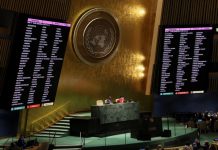Indian Prime Minister Narendra Modi’s Bharat Janatiya Party (BJP) government has ushered in a new wave of digital repression across India, as top government officials on Thursday met with Twitter executives to negotiate more stringent social media policies.
In a virtual meeting with global Twitter executives, a representative of the Indian government told the social media company that it was “welcome to do business in India” as long as it followed the laws of the country, “irrespective of Twitter’s own rules and guidelines.”
This development follows the mass blockade of up to 250 Twitter accounts on the request of the Indian government that had been actively tweeting about the farmers’ protests currently underscoring India’s political climate. The blocked accounts included accounts of journalists, activists, media organisations and political commentators, and their blockade was widely criticised as a move against global and Indian principles of freedom of speech. Six hours later, however, Twitter restored the blocked accounts.
The Indian government had requested Twitter through a legal notice to remove tweets with “incendiary hashtags” that were pro-farmers and anti-government, alleging that they were posted by Sikh separatist groups and backed by Pakistan. Twitter, however, later restored the accounts citing “insufficient justifications” for their suspension.
The Modi government then asked Twitter to remove the accounts again, threatening legal action—including up to seven years in jail—against the employees of Twitter’s Indian headquarters if they did not comply. The government maintained that the offending tweets were part of a “motivated campaign to abuse, inflame and create tension in society on unsubstantiated grounds.”
Twitter responded through a blog post on Wednesday, where it announced it had suspended up to 500 Twitter accounts, some permanently, that were engaged in “platform manipulation and spam.” Some accounts were blocked for viewership within India under its Country Withheld Content policy. However, Twitter did said it would not block the accounts of media organisations, journalists, activists, or politicians because that would “violate their fundamental right to free expression under Indian law.
“Because we do not believe that the actions we have been directed to take are consistent with Indian law, and, in keeping with our principles of defending protected speech and freedom of expression, we have not taken any action on accounts that consist of news media entities, journalists, activists, and politicians,” Twitter stated.
Twitter is not the only one to believe that the Modi government’s directives are against the Indian constitution. Many Indian digital rights activists have been vocal about the unconstitional nature of the government’s increasingly dictatorial policies. While India’s information technology law allows the blocking of content that “threatens the security of the state,” it also specifies that the originator of the content be given a hearing. No such hearing has ever taken place.
“This law is completely opaque and is rife for challenge,” Nikhil Pahwa, a digital rights activist, told BBC.
Academic surveillance
The BJP government’s attempts to control public conversation are not limited to social media, but have also infiltrated academic spaces.
In January, the Modi government introduced a new policy that all central and publicly funded educational institutions must have governmental approval for the speakers and the topics to be discussed at online seminars or meetings.
In an office memorandum by the Ministry of Education titled “Revised Guidelines for holding online/virtual Conferences, Seminars, Training, etc,” it is stated that all “central educational institutions, publicly-funded universities and organisations owned and controlled by the Government of India / State Government” need to get prior approval from the Ministry of External Affairs if they want hold online international conferences or seminars on subjects related to “security of State, Border, Northeast states, UT of J&K, Ladakh or any other issues which are clearly/purely related to India’s internal matter/s.”
Additionally, prior approval will be required from the “administrative secretary for the event as well as for the list of participants.” Prior permission will also be required from the ministry for “events involving sensitive subjects (political, scientific, technical, commercial, personal) with provisions for sharing of data in any form,” and recorded link of the event will be shared with the ministry.
This new policy has been met with criticism by proponents of digital and academic freedom across India, with many bemoaning the repressive new policies of the world’s “largest democracy.”
The Indian government’s policies have also been met with international critique. The American Historical Association, which is the world’s largest group of professional historians, released a statement strongly opposing the new guidelines. It stated that the guidelines “affect a wide range of scholarly exchanges that are critical to the free international expression of ideas” and said it “strongly maintains that government agencies should not intervene in the content of scholarly exchange.”









